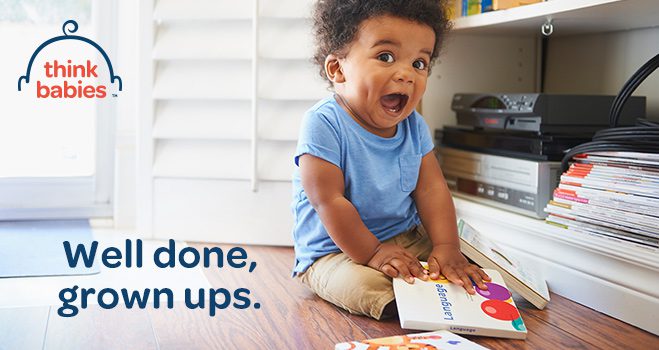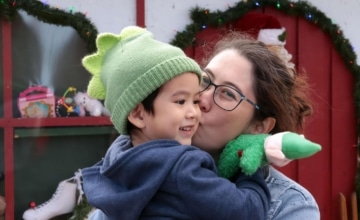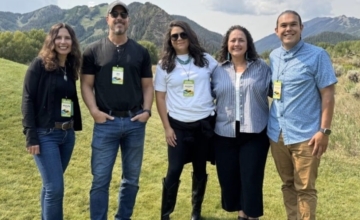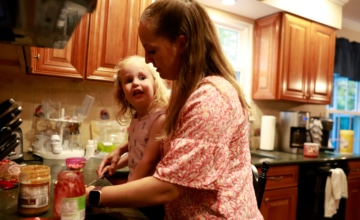Thank you for Thinking Babies in 2019. Let’s do it again in 2020!
There are 12 million infants and toddlers in the U.S., each born with unlimited potential. But we know that our current system of policies and programs has not kept up with what babies and families across the country need to thrive.
New data released in 2019 show that nearly 1 in 5 babies are born into poverty. Yet only 8 percent have access to Early Head Start, which could set them on a path to success. Only 17 percent of all working people in the United States have access to paid leave through their employers, despite the critical importance of this essential time for development. Only 4 percent of babies and toddlers in families with low- or moderate-incomes can access child care subsidies at a time when infant care costs more than college in the majority of states. And far too many babies and toddlers continue to be held in detention at our southern border and in facilities around the country, often separated from their families and under grossly inadequate care.
That’s why each day, infant-toddler advocates continue to show up – on Capitol Hill, in state capitals, on social media, and on the phone lines – to urge their leaders to Think Babies™ and prioritize the needs of babies and families. Nearly 70 national and state organizations have joined forces as partners in Think Babies, adding their power to our network of more than 50,000 dedicated advocates across the country.
Together, our voices are being heard. In 2019, our network of advocates continued to contact their policymakers, collectively reaching over 90% of Members of Congress. We reached up to 27 million people through social media and increased the visibility of infant-toddler issues through more than 300 media hits in national and state outlets. Finally, more than 1,700 people participated in seven Strolling Thunder™ events across the country this year, bringing the stories of babies and families directly to policymakers.
And together, we’re getting results. As we look back on 2019, ZERO TO THREE is excited to celebrate some full-sized wins for our tots, including:
- The state of America’s babies: The inaugural State of Babies Yearbook, from ZERO TO THREE and Child Trends, compared data on the national and state-by-state well-being of infants and toddlers across policy domains that are essential for a good start in life. For the first time, policymakers and advocates have the numbers they need to help them advance policies to improve the lives of babies and families.
- Think Babies success in states: ZERO TO THREE’s Think Babies state partners in Colorado, Georgia, New Jersey, North Carolina, Rhode Island, and Washington achieved numerous wins for babies, including rate-increases for infant and toddler child care in all six states; the creation of study committees charged with improving access to child care in Colorado and Washington; and the creation of a joint study committee on infant and toddler social and emotional health in Georgia.
- Bipartisan Congressional attention to paid leave: Momentum for paid leave in Congress continued to build throughout 2019 on both sides of the aisle, culminating with a December win as Congress passed paid parental leave for federal employees. The march toward a comprehensive paid family and medical leave policy was boosted by hearings in both the House Committee on Ways and Means and the House Committee on Oversight and Reform. Additionally, the Senate Finance Committee established a bipartisan working group to consider federal paid family leave policy. Finally, with several paid leave proposals currently on the table, the Family and Medical Insurance Leave (FAMILY) Act, which offers a comprehensive paid leave solution that babies and their families need, topped 200 cosponsors with bipartisan support.
- Paid leave progress in states: Several states took steps toward ensuring that families have adequate, unhurried time to bond with and care for their babies. Both Connecticut and Oregon will launch new paid family and medical leave programs soon, and California and New Jersey both took steps to extend existing programs this year. In addition, Washington’s new program will begin to pay benefits in January 2020.
- Protections for babies at the border: In September, the Federal District Court for the Central District of California upheld the Flores Settlement Agreement (FSA), guaranteeing essential protections for migrant children in custody, after the Administration proposed a new rule to significantly gut these protections. Throughout the year, ZERO TO THREE took several actions to support the FSA, including joining 20 other organizations on an amicus curiae brief that put babies in the forefront of adamant opposition to the new Rule.
- Increased budget support for home visiting: Several states, including Ohio, Pennsylvania, Texas, Washington, and others, acknowledged the critical nature of home visiting programs with increased funding in their budgets this year. Home visiting programs match parents with trained professionals who provide information and support starting during pregnancy and continuing throughout a child’s first years.
- Federal legislation introduced to promote infant and early childhood mental health: A bipartisan group of Senate and House Members joined together to introduce the Resilience Investment, Support, and Expansion (“RISE”) from Trauma Act, which would expand the trauma-informed workforce and increase resources for communities. In particular, the bill would establish an Infant and Early Childhood Clinical Mental Health Leadership Program to award grants to establish training institutes and centers of excellence.
- States strengthen IECMH systems and supports: The 20 state members of ZERO TO THREE’s IECMH Financing Policy Project have driven significant progress, increasing access to developmentally appropriate diagnosis and treatment through policy change. Tennessee, North Carolina, and Alabama pooled resources to create a southeast DC:0-5 training collaborative. Alaska included an IECMH focus in their recently approved Medicaid waiver, which for the first time will allow social determinants of health to qualify individuals for services, and help the state achieve one of their primary goals of increasing services for families and intervening as early as possible to support young children’s healthy development. Alabama and Maryland have newly created state government positions focused on IECMH. IECMH policy innovations are happening nationwide; in June, Maine Governor Janet Mills signed a law creating a statewide, voluntary early childhood consultation program that will support parents and teachers of young children with consultants who have advanced training in early childhood mental health and child development.
- Appropriations deal prioritizes babies and families: After weeks of talks, Senate and House of Representatives negotiators reached a bipartisan agreement on FY2020 appropriations bills. The deal—reached just before the end of the year—included several funding decisions that will help babies and families thrive. Key investments critical to babies’ healthy development include a $550 million increase for the Child Care and Development Block Grant; an increase of $550 million for Head Start/Early Head Start (EHS), of which $100 million is set aside to expand EHS, including through EHS-Child Care Partnerships; an increase of $2 million for the Infant-Early Childhood Mental Health Grant Program; a $7 million increase for the Infant-Toddler Court Program; a $7 million increase for Part C Early Intervention; and, a $25 million increase for Preschool Development Grants Birth-Five.
- Inclusion of babies in early childhood state system work: The Administration for Children and Families prioritized investments in babies by offering bonus points to Preschool Development Grant Birth-Five (PDG B-5) 2019 renewal applicants who proposed using the money to pilot or expand meaningful and high-quality infant and toddler services in their state systems. Find examples of how PDG B-5 is already strengthening services to babies in states here and here.




